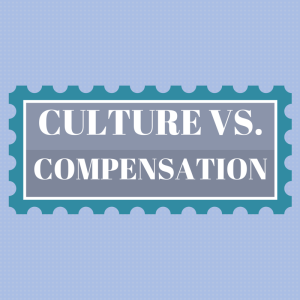 On Reflektive, a recent blog post about why culture matters more than compensation reinforces everything I have been saying about culture for years. Not the least of which is that a full 95% of employees say they believe it is more important than compensation. The article cites three key reasons for this:
On Reflektive, a recent blog post about why culture matters more than compensation reinforces everything I have been saying about culture for years. Not the least of which is that a full 95% of employees say they believe it is more important than compensation. The article cites three key reasons for this:
- Culture is a signal for success
- Culture is a self-fulfilling cycle
- Culture is every day
The evidence is everywhere. Successful company cultures produce better results. Period. When people are happy at work, they are more productive. When they are happy at work, they tell others about it and it’s easier to recruit and retain more good employees who fit the culture. Successful cultures are “lived” every day, in every way. It’s not just a mission statement or values posted on the wall, you can feel it.
However, there was an interesting Op-Ed piece in the New York Times over the weekend that detailed a trend that on the surface looks like hiring for culture, but underneath has morphed into something else. Culture is about values, what they are, what we stand for, and how that manifests on a daily basis. A “good culture” is one that aligns the company’s goals, best practices, clients and products around these values and doggedly stays inside these lines. Employees have the freedom to act on their own within the boundaries, but behavior outside the lines would be viewed as out of sync with the culture. People like predictability. When the goal posts keep changing or the guidelines are constantly revised, people lose faith in the leadership and ultimately become unhappy.
What was described in the Times article was that in the spirit of “hiring for culture” hiring managers were simply selecting those who were “like them” in experience. Meaning if they had the same hobbies, same interests or other personal things in common they were judged a “fit” for the culture. Basically, if they felt they would want to hang out with the candidate they were in. What this is leading to is a team who like one another as people, but may or may not be aligned on values AND a team that is NOT diverse. Diversity in an organization, ultimately leads to better performance precisely because of the differing ideas, not the homogeneity of everyone agreeing. Aligned culture is not about having gone to the same graduate school and liking whiskey as your drink, it’s about sharing values and people of very diverse backgrounds can share those.
When building great teams, it’s about getting the “best” minds and skills for the jobs and making sure that “who” they are is a fit with the culture. Meaning at the core, there are shared values. The only way to get to these shared values in an interview is by asking behavioral-based questions – what have they done before that reflects a specific value? Not what they would do in the future. If you like them, you will guide them to the right answer.
Yes, it matters that we like the people we work with, but more importantly, we need to share values. That will lead to a successful culture that is self-fulfilling and is lived every day. Hiring people because we like them personally and they are like us, will not lead to a successful culture.
